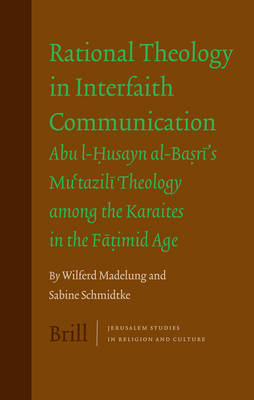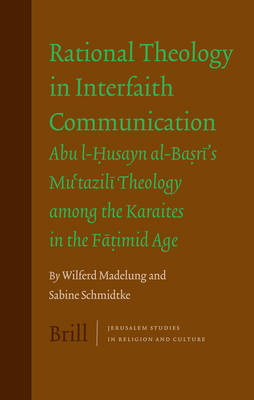
- Retrait gratuit dans votre magasin Club
- 7.000.000 titres dans notre catalogue
- Payer en toute sécurité
- Toujours un magasin près de chez vous
- Retrait gratuit dans votre magasin Club
- 7.000.0000 titres dans notre catalogue
- Payer en toute sécurité
- Toujours un magasin près de chez vous
Rational Theology in Interfaith Communication
Abu-I-Husayn Al-Basri's Mu'tazili Theology Among the Karaites in the Fatimid Age
Wilferd Madelung, Sabine Schmidtke
283,95 €
+ 567 points
Description
Rational speculative theology (kalam) in early Islam was represented most distinctly by the theological school of the Mu'tazila. Founded in Basra in the early 8th century, the school soon became predominant in theological scholarship and discourse and remained so until the early 11th century. The Mu'tazila held that the basic truths of theology, such as the existence of God and the nature of His attributes and justice, are entirely subject to rational proof without the benefit of scriptural revelation. Only after these basic truths have been established can the veracity of scripture be proved by reason, and the primacy of reason must also maintained in the interpretation of scripture. Mu'tazili theology naturally appealed to rationally inclined theologians of other scriptural religions and provided a suitable basis for inter-faith communication in the Islamic world. In Judaism Mu'tazili thought was adopted to varying degrees from the 9th century on and reached a peak during the tenth century.
The Mu'tazili world view and rational theology was facing increasing competition and criticism from philosophy of Greek origin, which claimed to provide the only scientific world view based on cogent logical demonstration independent of religious beliefs. Study of the philosophical sciences was mostly shunned in religious scholarship, but was an integral part of the education of the medical profession. Among Qadi 'Abd al-Jabbar's disciples in Rayy was for some time a young physician trained in the philosophical sciences, Abu l-Husayn al-Basri (d. 1044), who challenged some of his teaching in his lectures and went on to compose a massive critical review of the arguments and proofs used in kalam. His theological works were generally ignored among the Mu'tazila and handed down among students of medicine. Only a century later his teaching was revived and espoused by the Mu'tazili scholar Mahmud b. al-Malahimi in Khorezm in Central Asia and gained recognition as a school of Mu'tazili theology.
The present study presents evidence that Abu l-Husayn's theology was immediately registered and controversially debated in the Karaite community under the Fatimid caliphate. The study is based on source material preserved in Genizahs and now dispersed in libraries around the world.
The Mu'tazili world view and rational theology was facing increasing competition and criticism from philosophy of Greek origin, which claimed to provide the only scientific world view based on cogent logical demonstration independent of religious beliefs. Study of the philosophical sciences was mostly shunned in religious scholarship, but was an integral part of the education of the medical profession. Among Qadi 'Abd al-Jabbar's disciples in Rayy was for some time a young physician trained in the philosophical sciences, Abu l-Husayn al-Basri (d. 1044), who challenged some of his teaching in his lectures and went on to compose a massive critical review of the arguments and proofs used in kalam. His theological works were generally ignored among the Mu'tazila and handed down among students of medicine. Only a century later his teaching was revived and espoused by the Mu'tazili scholar Mahmud b. al-Malahimi in Khorezm in Central Asia and gained recognition as a school of Mu'tazili theology.
The present study presents evidence that Abu l-Husayn's theology was immediately registered and controversially debated in the Karaite community under the Fatimid caliphate. The study is based on source material preserved in Genizahs and now dispersed in libraries around the world.
Spécifications
Parties prenantes
- Auteur(s) :
- Editeur:
Contenu
- Nombre de pages :
- 144
- Langue:
- Anglais
- Collection :
- Tome:
- n° 5
Caractéristiques
- EAN:
- 9789004151772
- Date de parution :
- 27-10-06
- Format:
- Livre relié
- Format numérique:
- Genaaid
- Dimensions :
- 166 mm x 247 mm
- Poids :
- 439 g

Les avis
Nous publions uniquement les avis qui respectent les conditions requises. Consultez nos conditions pour les avis.






